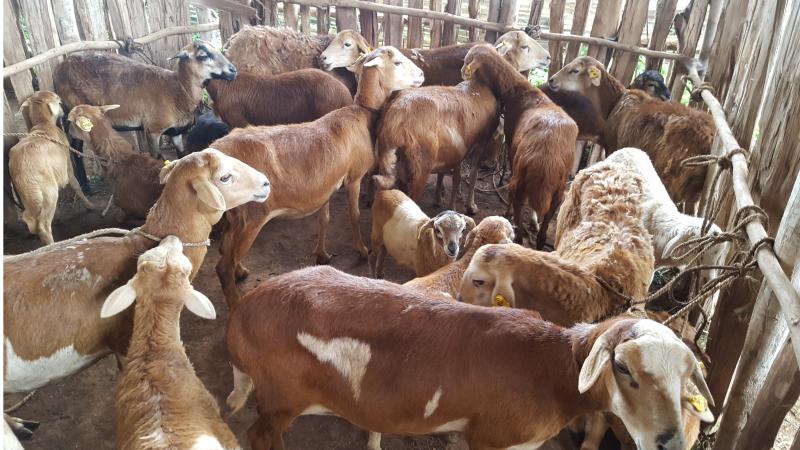Ethiopia: Community-based breeding for genetic improvement of sheep and goats

Doyogena, Ethiopia – The community-based breeding program was first introduced in Ethiopia in 2009 by ICARDA together with the International Livestock Research Institute, Boku University, and Ethiopian National Agricultural Research System (NARS). Commonly known as CBBP, it combines selective breeding programs based on production parameters, such as body weight and the ability to produce offspring, to increase productivity and reduce mortality of sheep and goats. Since then more than 40 programs have sprung up.
Evidence shows that indigenous small ruminant breeds have immense potential to contribute to sustainable livelihoods of smallholder farmers. To date, the programs have directly benefited 3,200 households in 40 villages with an average income increase of 20 percent in the CBBP sites of Bonga, Horro, and Menz. Farmers have created 35 formal breeders’ cooperatives to participate in the program.
Most of the participating households in Menz no longer need assistance from government-run safety-net programs that provide food; they now use income from sheep sales to buy food. The breeding cooperatives have been able to build capital from buying rams and bucks, as well as from other investments. For example, the Bonga cooperative has a capital of around US$60,000. There’s been a high demand to breed rams and bucks from neighboring communities and other governmental and NGO programs.
Based on the success, ICARDA has begun scaling out the program together with NARS, and the Ministry of Agriculture with support from the World Bank. In scaling out CBBP, it is important to continue to engage the public extension system, build capacity, share experience, and provide farmers with access to inputs and market. These are the central elements for CBBP’s success thus far.
The government has identified CBBP as the strategy for genetic improvement of small ruminants in the Ethiopia Master Plan and Growth and Transformation Plan II.
“We are going to fully support the scaling out of CBBP throughout the country,” said former State Minister of Agriculture Gebregziabher Gebreyohannes. “The integrated agro-industrial parks that will be established in different parts of the country will help enhance input access and create market linkage,” he added.
Earlier this year – March 27 and 28 – around 50 stakeholders from the government, led by State Minister Gebreyohannes, and from ILRI and ICARDA met at Hossena in southern Ethiopia for a workshop. They reviewed past achievements and set a future strategic framework for scaling out CBBP for sheep and goats of various local breeds throughout the country.
They also visited Doyogena to learn about CBBP’s data collection and reproductive technologies, which have supported the wide use of improved rams by the local communities. Farmers, both women and men, shared the benefits of adopting the breeding program. ICARDA donated ultrasound machines for pregnancy diagnosis to support eight reproductive platforms it has established together with the partners throughout the country.
The program is being replicated in Malawi, South Africa, Sudan, Tanzania, and Uganda.
This activity was supported by the International Fund for Agricultural Development’s SmaRT Ethiopia Project – Improving the Performance of Pro-Poor Sheep and Goat Value Chains for Enhanced Livelihoods, Food and Nutrition Security in Ethiopia, and CGIAR Research Program on Livestock.

![IKRI catalog of indigenous knowledge [credit: C. Biradar] IKRI catalog of indigenous knowledge [credit: C. Biradar]](/sites/default/files/images/2021-11/ikri_pic_1.jpg)
